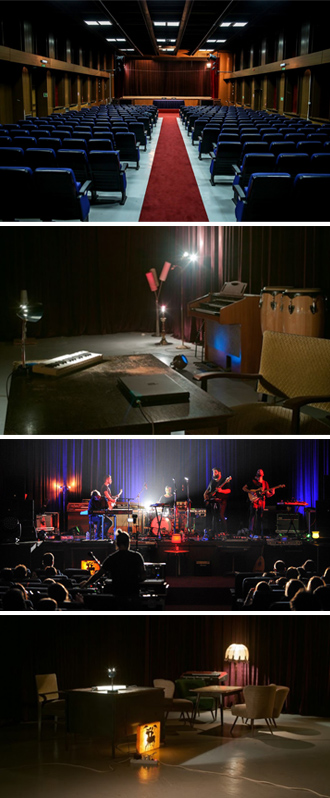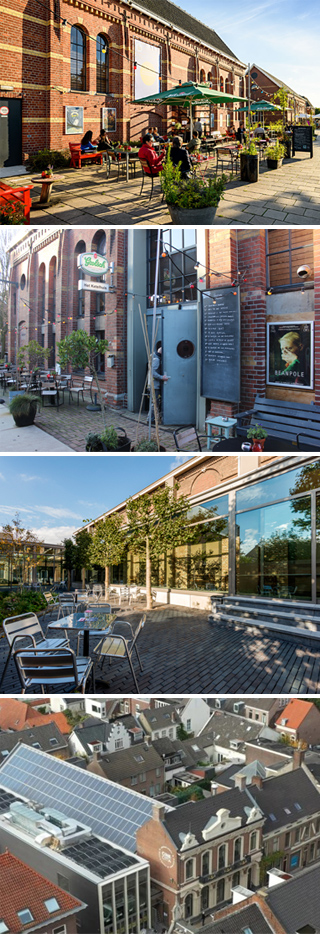
Reg. Trib. Milano n. 418 del 02.07.2007
- Direttore responsabile: Elisabetta Brunella
 |
 |
International Edition No. 190 - year 16 - 1st December 2021

more than 15,000 subscribers |
|
The Netherlands: the nouvelle vague is "novel food" Proof of this is the cricket hamburger, in pride of place on the menu of the Tilburg Cinecitta’s Ristobar. For 16.50 euros a taste can be had of the food of the future, stocking up on proteins and at the same time decreasing our environmental impact. And this is the philosophy of the Cinecitta, the arthouse cinema which since 1983 has been carrying forward a century-old tradition of screenings in this town in North Brabant, more or less halfway between Anvers and Rotterdam. Renovated and extended in 2012 and again in 2020, Cinecitta, whose name is an explicit homage to the Roman studios, has always placed its bets on quality films - purposely leaving aside the blockbusters - and in more recent years on ecological choices. Whilst the original building, dating back to 1904, has been left standing, the added wing has recently sported a set of solar panels which provide 25% of the energy necessary for running this urban, multi-screen complex. The Cinecitta obtains its remaining energy from renewable, green sources, and does not use gas, not even for the Ristobar, which has opted for induction cooking. In addition, instead of being wasted as usually happens, the heat generated by the five projectors, serving the same number of screens, is reintroduced into the heating circuit, using a system that is unique worldwide. This also makes it possible to save on air conditioning, which is necessary in the projection booths for the optimal functioning of the machinery. “Sustainability,” says Jasper Naaijkens, head of programming for Cinecitta, during a panel organized by the Creative Europe Desk MEDIA and Birgit Heidsiek, FFA Green Cinema Officer, at the beginning of October, “is part of our cinema’s DNA. The cricket hamburger, or the vegetarian version made of Dutch-grown seaweed, which has been on the menu since 2014, are not just curiosities. They are part of a precise strategy that aims to set up an authentic circular economy. It is no coincidence that our furnishings use second-hand products. And in the same spirit we make use of paper plates made from agricultural waste products, as well as bamboo cloths and biodegradable detersives for cleaning.” A similar approach is that of Het Ketelhuis, another arthouse cinema, this time in Amsterdam, also known for its rich programming for children and young people. As in Tilburg, the most immediate sign of its environmental sensitivity is the choice of the food on offer in its adjacent café, which is as compatible as possible with the ecosystem: all the dishes are strictly vegetarian and the milk and coffee are organic. And there is added value in the choice to obtain the coffee from a coffee roasting company employing ex-prisoners and giving them a second chance. To sum up, if, in the previous article, we stated that the cinemas of the near future will be greener, we can now add that they will also be sensitive to elements of social change not confined to the field of the environment. Or perhaps they will become forerunners - thanks to their strategies and obviously their programming - of changes in sensitivity and lifestyle. This article was published in issue no. 185 of Cinema & Video Int'l, the MEDIA Salles media partner. |
To quickly get to the previous issues, click on these buttons!
 |
MEDIA Salles Piazza Luigi di Savoia, 24 - 20124 Milano - Italy Tel.: +39.02.6739781 - Fax: +39.02.67397860 E-mail: infocinema@mediasalles.it |
|


 “
“ Nonetheless, despite the theme and the stimulus - or constraints - generated by the worldwide upheaval caused by Covid, the works exhibited at the Biennale 2021 seem to have privileged home environments rather than public spaces. As regards the cinema, the most striking intervention came from Bekim Ramku, of the Kosovo Architecture Foundation, in collaboration with Nol Binakaj, entitled “Prishtina Public Archipelago”.
Nonetheless, despite the theme and the stimulus - or constraints - generated by the worldwide upheaval caused by Covid, the works exhibited at the Biennale 2021 seem to have privileged home environments rather than public spaces. As regards the cinema, the most striking intervention came from Bekim Ramku, of the Kosovo Architecture Foundation, in collaboration with Nol Binakaj, entitled “Prishtina Public Archipelago”. More or less everyone agrees that Holland is a permissive country. This cliché is further confirmed in the context of “novel food”, the evocative expression which, with a more or less involuntary nod to the nouvelle cuisine, actually - according to the EU - designates those foods that up to 1997 were not widespread to any significant degree in the population of Europe. Specifically - worms and insects.
More or less everyone agrees that Holland is a permissive country. This cliché is further confirmed in the context of “novel food”, the evocative expression which, with a more or less involuntary nod to the nouvelle cuisine, actually - according to the EU - designates those foods that up to 1997 were not widespread to any significant degree in the population of Europe. Specifically - worms and insects. 